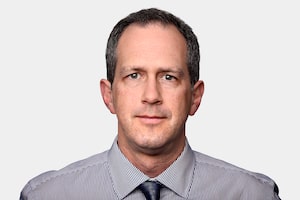Justin Trudeau and his wife Sophie Gregoire celebrate his win.Sean Kilpatrick/The Canadian Press
Justin Trudeau is the new leader of the Liberal Party, winning with an overwhelming majority on the first ballot, and warning Liberals the infighting is over.
It's time, he said, for Liberals to fight for Canadians.
He also spoke directly to Quebeckers, urging them to take a look at his Liberal Party as he tries to earn back their trust.
"Quebeckers, let's be builders again," he said in his nearly 30-minute-long acceptance speech. "I want to deserve your trust. You have always participated in building this country alongside other Canadians."
Very little was said about the economy. He mentioned his famous father, Pierre Trudeau, only once. "I don't care if you thought my father was great or arrogant," he said. "It doesn't matter to me whether you were a Chrétien Liberal or a Martin Liberal … The era of hyphenated Liberals ends right here, right now, tonight."
Mr. Trudeau also spent much of his speech warning Liberals of expected Conservative attacks. He accused the Harper Tories of not being afraid of him. Rather, they are afraid of engaged Canadians.
"Our country is blessed with countless numbers of activist citizens and they have come out by the thousands over the course of this campaign," he said. "Canadians who thought they were sending community leaders to be their voice in Ottawa instead got back only Mr. Harper's voice in their community."
The Liberals are expecting the Tories to attack Mr. Trudeau as they did previous leaders, Stéphane Dion and Michael Ignatieff.
The Harper Conservatives issued a short statement just after Mr. Trudeau was elected.
"Justin Trudeau may have a famous last name, but in a time of global economic uncertainty, he doesn't have the judgement or experience to be Prime Minister," said Fred DeLorey, the director of communications for the Conservative Party.
None of Mr. Trudeau's five leadership rivals were even close. He won with about 77.8 per cent of the vote, garnering 81,389 of the more than 100,000 votes cast.
His biggest test comes Monday as he will face Prime Minister Stephen Harper and NDP Leader Thomas Mulcair in the House of Commons. He also must try to continue the momentum built over the campaign into a federal campaign expected in 2015.
He begins his tenure as the leader of the third party in the House of Commons with about $1-million more in the Grit's war chest that he was able to amass during the six-month campaign.
He also signed up thousands of new supporters to the party. More than 100,000 Liberal supporters cast their ballots by phone or online over a week of voting and voter turnout was 82 per cent.
"This is the largest number of people to elect a leader of any political party in the history of Canada," said Liberal chief electoral officer Steven MacKinnon.
Voting began just after the candidates made their final speeches in Toronto last Saturday at their so-called National Showcase.
This was a new way to elect the leader as the party decided against a delegated convention.
Former prime minister Jean Chretien, who spoke just before the results were announced, called this the "beginning of the end of the Conservative government."
Mr. Chretien had served in Mr. Trudeau's father's cabinet. In his speech, Mr. Chretien looked back at past Liberal glories, listing the fact that a Liberal government brought in a new Canadian flag, the Kyoto protocol, balanced budgets, the Clarity Act and said "no" to the war in Iraq.
Mr. Trudeau, 41, launched his campaign on Oct. 2 in the riding of Papineau, on the day that his late brother Michel would have turned 37.
Mr. Trudeau was accompanied on the stage that day by wife Sophie Grégoire and their two children, and he has received backroom help during the race from his other brother, Alexandre.
Mr. Trudeau has laid out little policy during the race, focusing on the values and the high-level priorities that he would embrace as prime minister, with a clear emphasis on education.
The decision to hold off on policies was heavily criticized by his leadership rivals, but Mr. Trudeau explained during the race that he wants the party's grassroots to play a role in developing the next election platform. In addition, his team felt it would be premature to unveil major initiatives with two years to go before the next election.
Mr. Trudeau has not relied on endorsements from Liberal veterans during the race, trying instead to create a younger and modern movement fuelled by volunteers and newcomers to the world of politics.
Mr. Trudeau's first major test as leader will come on May 13 when a by-election is held in the riding of Labrador. He is expected to travel to the riding before voting day, and his party is the favourite to take back the seat that was in Conservative hands until the recent resignation of MP and intergovernmental affairs minister Peter Penashue.
Full results:
104,552 Liberal members and supporters cast a ballot in the leadership race, making turnout 82.16 per cent.
The party's voting system gave Canada's 308 ridings equal weight in the final tally. Each riding was given 100 points, and a candidate got the number of points equal to the percentage of votes they won in that riding.
There were 30,800 points in total, with 15,401 needed to win. The final results:
- Former cabinet minister Martin Cauchon got 815 points.
- Toronto lawyer Deborah Coyne got 214 points.
- Former MP Martha Hall Findlay got 1,760 points.
- Retired military officer Karen McCrimmon got 210 points.
- B.C. MP Joyce Murray got 3,130 points.
- Quebec MP Justin Trudeau got 24,668 points, winning in the first round of the preferential ballot.
 Daniel Leblanc
Daniel Leblanc